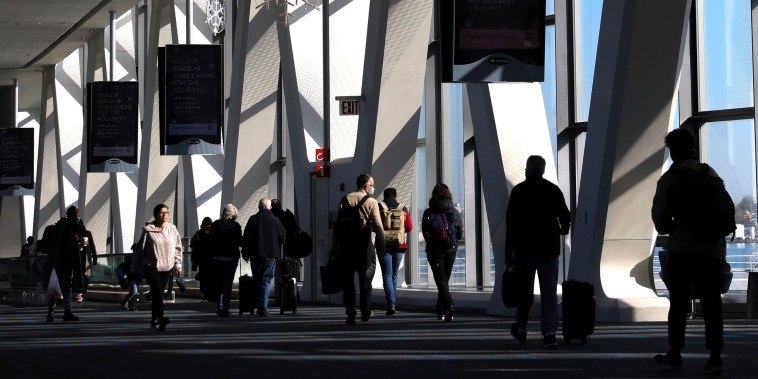
Travelers are getting out of town earlier for Thanksgiving this year
More people are expected on airplanes and highways over Thanksgiving than last year, but changing habits around work and play might spread out the crowds and reduce the usual amount of holiday travel stress.
Travel experts say the pandemic and the ability of many people to work remotely has blurred the lines between business and leisure trips. They think many people will start holiday trips early or return home later than normal because they will spend a few days working remotely — or at least tell the boss they’re working remotely.
The busiest travel days during Thanksgiving week are usually Tuesday, Wednesday and the Sunday after the holiday. This year, the Federal Aviation Administration expects Tuesday to be the busiest travel day with roughly 48,000 scheduled flights.
It looks like the rush started early this year, as the Transportation Security Administration screened nearly 2.33 million travelers on Sunday. It’s the first year that the number of people catching planes surpassed the 2.32 million screened the Sunday before Thanksgiving in 2019, before the COVID-19 pandemic began.
“People are traveling on different days. Not everyone is traveling on that Wednesday night,” says Sharon Pinkerton, senior vice president at the trade group Airlines for America. “People are spreading their travel out throughout the week, which I also think will help ensure smoother operations.”
James Daly of Mission Viejo, California, caught a plane Monday to Oakland with his wife and two young children, getting a head start because the airfare was less expensive that way. Daly, a teacher who was off for the week, said they were also taking advantage of his wife’s ability to work remotely.
“The economy is a little concerning but that’s life,” said Daly, who was traveling to see his parents and extended family flying in from Ireland. “Everything’s getting back to normal since COVID … So, you want to be part of that joy and part of those relationships.”
AAA predicts that 54.6 million people will travel at least 50 miles from home in the U.S. this week, a 1.5% bump over Thanksgiving last year and only 2% less than in 2019. The auto club and insurance seller says nearly 49 million of those will travel by car, and 4.5 million will fly between Wednesday and Sunday.
U.S. airlines struggled to keep up as the number of passengers surged this year.
“We did have a challenging summer,” said Pinkerton, whose group speaks for members including American, United and Delta. She said that airlines have pared their schedules and hired thousands of workers — they now have more pilots than before the pandemic. “As a result, we’re confident that the week is going to go well.”
U.S. airlines plan to operate 13% fewer flights this week than during Thanksgiving week in 2019. However, by using larger planes on average, the number of seats will drop only 2%, according to data from travel-researcher Cirium.
Airlines continue to blame flight disruptions on shortages of air traffic controllers, especially in Florida, a major holiday destination.
Controllers, who work for the Federal Aviation Administration, “get tested around the holidays. That seems to be when we have challenges,” Frontier Airlines CEO Barry Biffle said a few days ago. “The FAA is adding another 10% to headcount, hopefully that’s enough.”
Transportation Secretary Pete Buttigieg has disputed such claims, saying that the vast majority of delays and cancellations are caused by the airlines themselves.
TSA expects airports to be busier than last year and probably about on par with 2019. The busiest day in TSA’s history came on the Sunday after Thanksgiving in 2019, when nearly 2.9 million people were screened at airport checkpoints.
“There’s a lot more hustle and bustle,” says Corliss King, a Chicago-based flight attendant for Southwest Airlines. “We’re on high alert for unruly behavior” — airlines have filed 8,000 reports of disruptive passengers over the past two years — “but I’m hoping that people will pack their patience and it will translate into less-stressful holiday travel.”
People getting behind the wheel or boarding a plane don’t seem fazed by higher gasoline and airfare prices than last year or the widespread concern about inflation and the economy. That is already leading to predictions of strong travel over Christmas and New Year’s.
“This pent-up demand for travel is still a real thing. It doesn’t feel like it’s going away,” says Tom Hall, a vice president and longtime writer for Lonely Planet, the publisher of travel guides. “That’s keeping planes full, that’s keeping prices high.”
